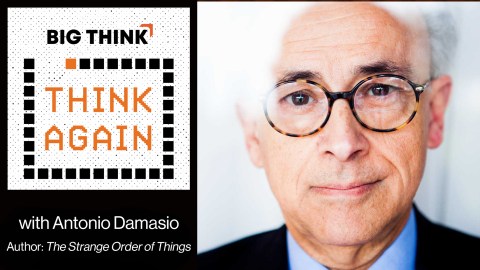This incredibly rich machinery – with Antonio Damasio

- “Prior to nervous systems: no mind, no consciousness, no intention in the full sense of the term. After nervous systems, gradually we ascend to this possibility of having to this possibility of having minds, having consciousness, and having reasoning that allows us to arrive at some of these very interesting decisions.”
- “We are fragile culturally and socially…but life is fragile to begin with. All that it takes is a little bit of bad luck in the management of those supports, and you’re cooked…you can actually be cooked—with global warming!”
Quick question. Answer without thinking too hard. Ready? Where is your mind? What is your mind?
Ok, Raise your hand if you thought of your brain.
If you did, you’re in good company. For centuries, Western science, culture, and language has been obsessed with the head as the center of thought and the body as the center of feeling. This split can get hierarchical, attaching ideas like “sin” and to the body and the emotions while putting the brain, along with rationality, up on a pedestal. Picture your brain on a pedestal: not doing much good up there, is it?
I’m very happy to be speaking again today with neuroscientist and philosopher Antonio Damasio, who has done more than anyone one else I know to get that brain down off its high horse and reattach it to the body. We last talked a year ago, about his book THE STRANGE ORDER OF THINGS – Life, Feeling, and the Making of Cultures, which has now come out in paperback. It turns everything upside down, not only re-anchoring mind in body, but finding in primitive bacteria and social insects patterns that help explain human culture. Maybe there’s more going on in the Mona Lisa than in a bacterial colony, but they also have quite a lot in common.
Surprise conversation starters in this episode:





